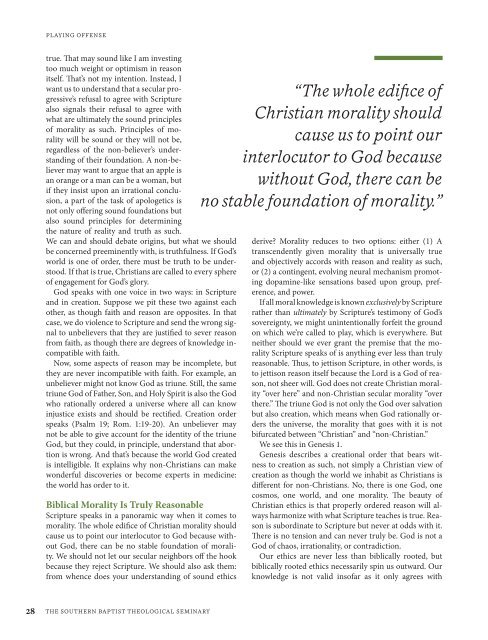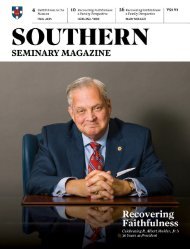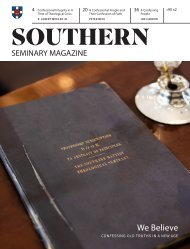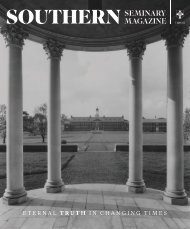Southern Seminary Magazine (Vol 90.1) The Light of Truth: Apologetics in the 21st Century
Create successful ePaper yourself
Turn your PDF publications into a flip-book with our unique Google optimized e-Paper software.
play<strong>in</strong>g <strong>of</strong>fense<br />
true. That may sound like I am <strong>in</strong>vest<strong>in</strong>g<br />
too much weight or optimism <strong>in</strong> reason<br />
itself. That’s not my <strong>in</strong>tention. Instead, I<br />
want us to understand that a secular progressive’s<br />
refusal to agree with Scripture<br />
also signals <strong>the</strong>ir refusal to agree with<br />
what are ultimately <strong>the</strong> sound pr<strong>in</strong>ciples<br />
<strong>of</strong> morality as such. Pr<strong>in</strong>ciples <strong>of</strong> morality<br />
will be sound or <strong>the</strong>y will not be,<br />
regardless <strong>of</strong> <strong>the</strong> non-believer’s understand<strong>in</strong>g<br />
<strong>of</strong> <strong>the</strong>ir foundation. A non-believer<br />
may want to argue that an apple is<br />
an orange or a man can be a woman, but<br />
if <strong>the</strong>y <strong>in</strong>sist upon an irrational conclusion,<br />
a part <strong>of</strong> <strong>the</strong> task <strong>of</strong> apologetics is<br />
not only <strong>of</strong>fer<strong>in</strong>g sound foundations but<br />
also sound pr<strong>in</strong>ciples for determ<strong>in</strong><strong>in</strong>g<br />
<strong>the</strong> nature <strong>of</strong> reality and truth as such.<br />
We can and should debate orig<strong>in</strong>s, but what we should<br />
be concerned preem<strong>in</strong>ently with, is truthfulness. If God’s<br />
world is one <strong>of</strong> order, <strong>the</strong>re must be truth to be understood.<br />
If that is true, Christians are called to every sphere<br />
<strong>of</strong> engagement for God’s glory.<br />
God speaks with one voice <strong>in</strong> two ways: <strong>in</strong> Scripture<br />
and <strong>in</strong> creation. Suppose we pit <strong>the</strong>se two aga<strong>in</strong>st each<br />
o<strong>the</strong>r, as though faith and reason are opposites. In that<br />
case, we do violence to Scripture and send <strong>the</strong> wrong signal<br />
to unbelievers that <strong>the</strong>y are justified to sever reason<br />
from faith, as though <strong>the</strong>re are degrees <strong>of</strong> knowledge <strong>in</strong>compatible<br />
with faith.<br />
Now, some aspects <strong>of</strong> reason may be <strong>in</strong>complete, but<br />
<strong>the</strong>y are never <strong>in</strong>compatible with faith. For example, an<br />
unbeliever might not know God as triune. Still, <strong>the</strong> same<br />
triune God <strong>of</strong> Fa<strong>the</strong>r, Son, and Holy Spirit is also <strong>the</strong> God<br />
who rationally ordered a universe where all can know<br />
<strong>in</strong>justice exists and should be rectified. Creation order<br />
speaks (Psalm 19; Rom. 1:19-20). An unbeliever may<br />
not be able to give account for <strong>the</strong> identity <strong>of</strong> <strong>the</strong> triune<br />
God, but <strong>the</strong>y could, <strong>in</strong> pr<strong>in</strong>ciple, understand that abortion<br />
is wrong. And that’s because <strong>the</strong> world God created<br />
is <strong>in</strong>telligible. It expla<strong>in</strong>s why non-Christians can make<br />
wonderful discoveries or become experts <strong>in</strong> medic<strong>in</strong>e:<br />
<strong>the</strong> world has order to it.<br />
Biblical Morality Is Truly Reasonable<br />
Scripture speaks <strong>in</strong> a panoramic way when it comes to<br />
morality. <strong>The</strong> whole edifice <strong>of</strong> Christian morality should<br />
cause us to po<strong>in</strong>t our <strong>in</strong>terlocutor to God because without<br />
God, <strong>the</strong>re can be no stable foundation <strong>of</strong> morality.<br />
We should not let our secular neighbors <strong>of</strong>f <strong>the</strong> hook<br />
because <strong>the</strong>y reject Scripture. We should also ask <strong>the</strong>m:<br />
from whence does your understand<strong>in</strong>g <strong>of</strong> sound ethics<br />
“<strong>The</strong> whole edifice <strong>of</strong><br />
Christian morality should<br />
cause us to po<strong>in</strong>t our<br />
<strong>in</strong>terlocutor to God because<br />
without God, <strong>the</strong>re can be<br />
no stable foundation <strong>of</strong> morality.”<br />
derive? Morality reduces to two options: ei<strong>the</strong>r (1) A<br />
transcendently given morality that is universally true<br />
and objectively accords with reason and reality as such,<br />
or (2) a cont<strong>in</strong>gent, evolv<strong>in</strong>g neural mechanism promot<strong>in</strong>g<br />
dopam<strong>in</strong>e-like sensations based upon group, preference,<br />
and power.<br />
If all moral knowledge is known exclusively by Scripture<br />
ra<strong>the</strong>r than ultimately by Scripture’s testimony <strong>of</strong> God’s<br />
sovereignty, we might un<strong>in</strong>tentionally forfeit <strong>the</strong> ground<br />
on which we’re called to play, which is everywhere. But<br />
nei<strong>the</strong>r should we ever grant <strong>the</strong> premise that <strong>the</strong> morality<br />
Scripture speaks <strong>of</strong> is anyth<strong>in</strong>g ever less than truly<br />
reasonable. Thus, to jettison Scripture, <strong>in</strong> o<strong>the</strong>r words, is<br />
to jettison reason itself because <strong>the</strong> Lord is a God <strong>of</strong> reason,<br />
not sheer will. God does not create Christian morality<br />
“over here” and non-Christian secular morality “over<br />
<strong>the</strong>re.” <strong>The</strong> triune God is not only <strong>the</strong> God over salvation<br />
but also creation, which means when God rationally orders<br />
<strong>the</strong> universe, <strong>the</strong> morality that goes with it is not<br />
bifurcated between “Christian” and “non-Christian.”<br />
We see this <strong>in</strong> Genesis 1.<br />
Genesis describes a creational order that bears witness<br />
to creation as such, not simply a Christian view <strong>of</strong><br />
creation as though <strong>the</strong> world we <strong>in</strong>habit as Christians is<br />
different for non-Christians. No, <strong>the</strong>re is one God, one<br />
cosmos, one world, and one morality. <strong>The</strong> beauty <strong>of</strong><br />
Christian ethics is that properly ordered reason will always<br />
harmonize with what Scripture teaches is true. Reason<br />
is subord<strong>in</strong>ate to Scripture but never at odds with it.<br />
<strong>The</strong>re is no tension and can never truly be. God is not a<br />
God <strong>of</strong> chaos, irrationality, or contradiction.<br />
Our ethics are never less than biblically rooted, but<br />
biblically rooted ethics necessarily sp<strong>in</strong> us outward. Our<br />
knowledge is not valid <strong>in</strong>s<strong>of</strong>ar as it only agrees with<br />
28 <strong>the</strong> sou<strong>the</strong>rn baptist <strong>the</strong>ological sem<strong>in</strong>ary






